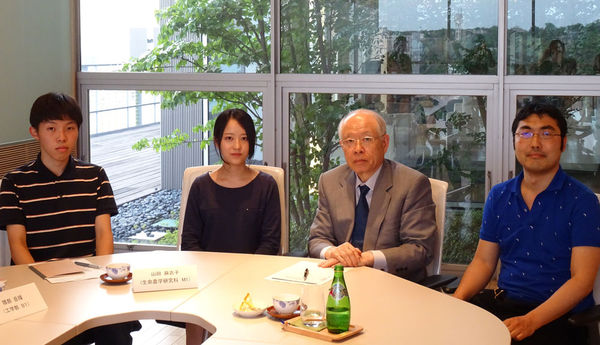Since January 2013, University Prof. Ryoji Noyori, a Nobel Laureate in Chemistry (2001), has contributed numerous articles to "Kamitsubute" in Chunichi Shimbun. Based on these articles, he holds regular academic talks with students at Nagoya University. At the Fifteenth Noyori Academy Salon, held on May 25, 2015, Prof. Noyori and three youths from different academic fields at Nagoya University openly discussed the topic "For the Proper Evaluation of Research Performance." In "Kamitsubute," Prof. Noyori criticized the assessment system to place relative numerical values on personal resources and research activities. Also referring to Japan's entrance examinations, the important thing he argued is not one's numerical score but how much one can grow in the future.

Mitsuhiro Kimura, a postdoctoral researcher at the Kobayashi-Maskawa Institute for the Origin of Particles and the Universe
How can we evaluate human values if scoring is not an appropriate method?
Prof. Noyori
It is impossible to assess people merely through examinations. You would need a third party, who has observed you for a couple of years. His or her comments on your leadership, cooperativeness, human relations, and physical strength could be trusted. On the other hand, numerical scores can measure only a part of your knowledge and effort. I believe that all human assessments are subjective; thus, the obligation to provide a fair assessment rests with those who conduct the evaluation. Currently, you may have an opportunity to take interview tests or recommendations for entrance examinations. The important factor is how much you can grow in the future. Numerical scores given by academic exams are not truly necessary, but some stage or grade can sufficiently evaluate human values.
Maiko Yamada, a first year student at the Graduate School of Bioagricultural Sciences
I suppose that presentation skills are required for a good evaluation. What presentation skills should we acquire and how?
Prof. Noyori
I suggest that you take advantage of your own characteristics. Despite the challenges of developing on one’s own—as Prof. Isamu Akasaki said, “ware hitori arano wo iku” (i.e., “I go on my way in the wilderness”)—people who can develop their own ideas and make strong individual efforts are greatly admired.
Currently, presentation styles are losing their originality because of the availability of copyable templates. The important factor is impact or making an impression on your audience. For foreign audiences, you must further add the “J-brand” to your presentation; that is, you should be proud of Japanese culture as a Japanese citizen.
Takeru Kumabe, a fresher at the School of Engineering
How did you spend your time in your school days?
Prof. Noyori
In spite of our poverty, a marvelous pleasure was that we had freedom. We were always out having fun independently, away from our parents. We were never passive: we were active and played hard.
I have often been asked why Japan or Nagoya University has produced so many Nobel laureates. One of the assessment criteria for the Nobel Prize is originality, and I feel that Japan has such a unique culture. In addition, the poverty prevalent in Japan during our youth could also have helped us win these prizes because we know how to be patient and even sustain our efforts in tough times. I guess that Prof. Akasaki must feel the same way: we did not have many options, and therefore, we were stubbornly dedicated in following through with our original intentions.
Original article published in Chunichi Shimbun on May 26, 2015.